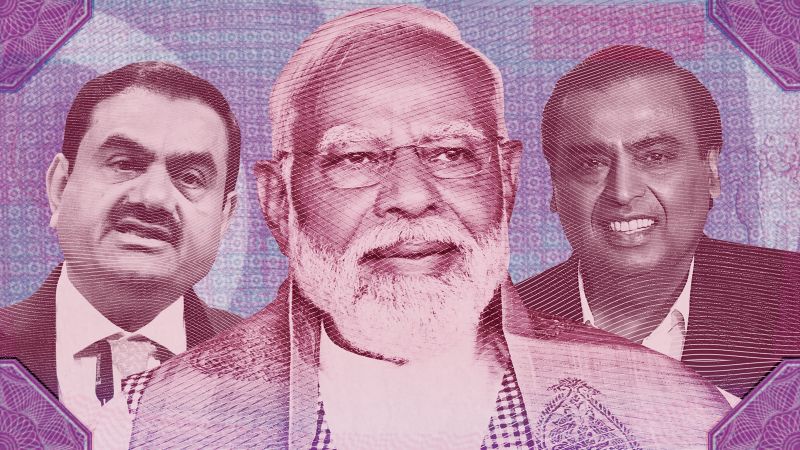In India’s financial capital Mumbai, billionaires Mukesh Ambani and Gautam Adani are reshaping the landscape with their massive conglomerates. Their influence is evident in the city’s infrastructure, including the international airport operated by Adani. Both businessmen have become key players in India’s economic transformation, as they invest in sectors prioritized for development by Prime Minister Narendra Modi. Their companies, Reliance Industries and the Adani Group, are worth over $200 billion each and are driving significant growth in sectors ranging from fossil fuels to technology.
Ambani and Adani are often compared to industrialists like John D Rockefeller, who shaped America’s infrastructure during the Gilded Age. The rapid expansion of trains, factories, and urban centers in India mirrors the growth experienced by other countries during periods of industrialization. These periods of growth often lead to rising inequality, crony capitalism, and income accumulation at the top, characteristics also seen in the Indian economy. Despite becoming the world’s fifth-largest economy under Modi’s leadership, India still faces challenges such as soaring youth unemployment and inequality.
To spur further growth, the Modi government has embarked on a massive infrastructure transformation, investing in projects like roads, ports, airports, and railways. Digital connectivity is also a priority, with both Ambani and Adani playing crucial roles in boosting connectivity through digital innovation. Reliance Industries, founded by Dhirubhai Ambani, has transformed into a tech powerhouse under Mukesh Ambani’s leadership. Adani, a first-generation entrepreneur, has diversified his businesses into sectors like ports, power, defense, and aerospace, positioning his group as an essential player in India’s development.
Both Ambani and Adani have pivoted towards investing in clean energy, aligning with India’s ambitious climate goals. Despite facing challenges like political scrutiny and allegations of fraud, Adani has managed to attract investments from foreign partners and continue his business expansion. The close relationship between Modi and the billionaire businessmen has raised questions about crony capitalism in India, but experts also note that some level of cooperation between politicians and business leaders can benefit the economy. However, it is essential to maintain competition and innovation by encouraging entrepreneurship and making it easier for smaller firms to grow in order to prevent stagnation in the economy.
India’s economic growth potential remains high, with analysts forecasting the country to become the third-largest economy in the world by 2027. The influence of conglomerates like Reliance Industries and the Adani Group will continue to play a vital role in shaping India’s economic future. As the country strives for further growth and development, balancing the power and influence of these billionaire businessmen with the need for a diverse and competitive business landscape will be crucial for sustained economic prosperity.













